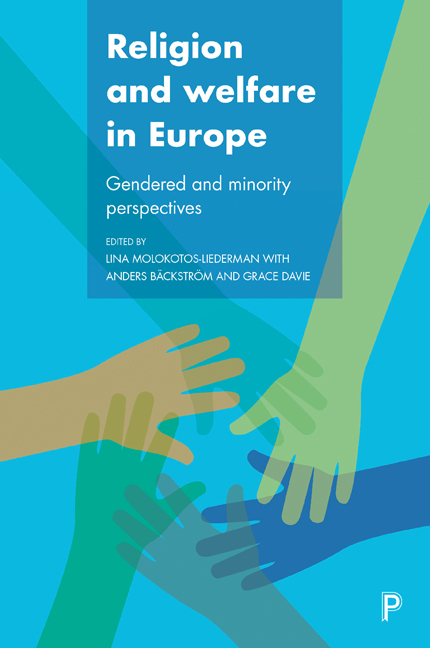Book contents
- Frontmatter
- Contents
- List of tables, figures and maps
- Acknowledgements
- Notes on contributors
- one Introduction
- Part One Thinking methodologically: approaches to research and practice
- Part Two Thinking regionally: key case studies in welfare and religion in Europe
- Part Three Gendered and minority perspectives
- Part Four Drawing the threads together
- Appendix: the WaVE team
- Index
Five - The WaVE project as a record of religious and social transformations in northern Europe
Published online by Cambridge University Press: 05 April 2022
- Frontmatter
- Contents
- List of tables, figures and maps
- Acknowledgements
- Notes on contributors
- one Introduction
- Part One Thinking methodologically: approaches to research and practice
- Part Two Thinking regionally: key case studies in welfare and religion in Europe
- Part Three Gendered and minority perspectives
- Part Four Drawing the threads together
- Appendix: the WaVE team
- Index
Summary
Introduction
Welfare and Values in Europe: Transitions Related to Religion, Minorities and Gender (WaVE), and its predecessor Welfare and Religion in a European Perspective: A Comparative Study of the Role of the Churches as Agents of Welfare within the Social Economy (WREP), focused on two aspects of European society that have been interconnected throughout history. Social care, as an expression of social concern, has always been central to religion (Glock and Stark, 1965; Smart, 1993). Similarly, nation states through different forms of governance have always had responsibility for caring for the poor, sick, disabled and elderly. This responsibility has however shifted over time, moving between public institutions (the state), the family, and religious, non-profit or private actors.
This ‘interactive’ relationship between the welfare state and religion was thought to have reached an end during the so-called golden decades of the welfare state in Europe following the Second World War. In the Nordic countries, and particularly in Sweden, this development was expressed in the high value placed on democracy, equality and private freedoms, alongside high levels of trust in societal institutions (Rothstein, 2011). This combination was increasingly associated with a secular view of society, as the World Values Survey (WVS) has shown. Moreover, the Swedish (Nordic) approach was considered a model for the world to follow (Inglehart, 1997). The Swedes themselves perceived this way of working to be the culmination of civilisational development in the spirit of Fukuyama (1992), resulting in a feeling that their country was exceptional as far as social morality was concerned (Uvell, 2016).
At the same time, it has become increasingly clear that Sweden is subject to the same transformations that have characterised the western world since the 1980s. This is reflected in the increasing deregulation of welfare institutions (school, healthcare and social care) which has both social and ideological foundations. The former reflect the increased costs brought about by a variety of factors, including migration, social exclusion and the demands of an ageing population. The latter are based on a market approach, underpinned by a customer- and efficiency-oriented perspective in which the users of social welfare are viewed as ‘clients’ served within a cost-benefit perspective.
- Type
- Chapter
- Information
- Religion and Welfare in EuropeGendered and Minority Perspectives, pp. 77 - 106Publisher: Bristol University PressPrint publication year: 2017



